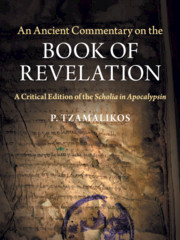Book contents
- Frontmatter
- Contents
- Preface
- Exordium
- Abbreviations
- Introduction
- Part I Text of Revelation and Scholia in Apocalypsin
- Scholion I
- Scholion II
- Scholion III
- Scholion IV
- Scholion V
- Scholion VI
- Scholion VII
- Scholion VIII
- Scholion IX
- Scholion X
- Scholion XI
- Scholion XII
- Scholion XIII
- Scholion XIV
- Scholion XV
- Scholion XVI
- Scholion XVII
- Scholion XVIII
- Scholion XIX
- Scholion XX
- Scholion XXI
- Scholion XXII
- Scholion XXIII
- Scholion XXIV
- Adnotatio Post Scholion XXIV
- Scholion XXV
- Scholion XXVI
- Scholion XXVII
- Scholion XXVIII
- Scholion XXIX
- Scholion XXX
- Scholion XXXI
- Scholion XXXII
- Scholion XXXIII
- Scholion XXXIV
- Scholion XXXV
- Scholion XXXVI
- Scholion XXXVII
- Scholion XXXVIII
- Scholion XXXIX
- Part II Expanded Notes to the Scholia
- Bibliography
- Index of authors cited in the scholia
- Index of Names in the Scholia
- Index of terms in the scholia
- Biblical citations in the scholia
- Index of modern authors
- General index
Scholion V
from Part I - Text of Revelation and Scholia in Apocalypsin
Published online by Cambridge University Press: 05 August 2014
- Frontmatter
- Contents
- Preface
- Exordium
- Abbreviations
- Introduction
- Part I Text of Revelation and Scholia in Apocalypsin
- Scholion I
- Scholion II
- Scholion III
- Scholion IV
- Scholion V
- Scholion VI
- Scholion VII
- Scholion VIII
- Scholion IX
- Scholion X
- Scholion XI
- Scholion XII
- Scholion XIII
- Scholion XIV
- Scholion XV
- Scholion XVI
- Scholion XVII
- Scholion XVIII
- Scholion XIX
- Scholion XX
- Scholion XXI
- Scholion XXII
- Scholion XXIII
- Scholion XXIV
- Adnotatio Post Scholion XXIV
- Scholion XXV
- Scholion XXVI
- Scholion XXVII
- Scholion XXVIII
- Scholion XXIX
- Scholion XXX
- Scholion XXXI
- Scholion XXXII
- Scholion XXXIII
- Scholion XXXIV
- Scholion XXXV
- Scholion XXXVI
- Scholion XXXVII
- Scholion XXXVIII
- Scholion XXXIX
- Part II Expanded Notes to the Scholia
- Bibliography
- Index of authors cited in the scholia
- Index of Names in the Scholia
- Index of terms in the scholia
- Biblical citations in the scholia
- Index of modern authors
- General index
Summary
‹Σχόλιον ε΄›
EPΟὐ γίνεται ἀτεχνῶς ἓν ὡς ἕν, οὐδὲ πολλὰ ὡς μέρη ὁ υἱός, ἀλλ᾿ ὡς πάντα ἕν. ἔνθεν καὶ πάν‹τα›. κύκλος γὰρ ὁ αὐτὸς πασῶν τῶν δυνάμεων εἰς ἛΝ εἰλουμένων καὶ ἑνουμένων. διὰ τοῦτο τὸ Α καὶ Ω ὁ ‹Λ›όγος εἴρηται, οὗ μόνου τὸ τέλος ἀρχὴ γίνεται καὶ τελευτᾷ πάλιν, ἐπὶ τὴν ἄνωθεν ἀρχήν, οὐδαμοῦ διάστασιν λαβών· διὸ δὴ καὶ τὸ εἰς αὐτὸν καὶ δι᾿ αὐτοῦ πιστεῦσαι μοναδικόν ἐστι γεν‹έ›σθαι‹,› ἀπερισπάστως ἑνούμενον ἐν αὐτῷ· τὸ δὲ ἀπιστῆσαι διστάσαι ἐστὶν καὶ διαστῆναι καὶ μερισθῆναι.
Scholion V
The Son does not become one in the simple sense, since he is one, neither does he become manifold as if he comprised parts; but he is one, in the sense of being everything and in whom everything originates. For he is the same circle of all powers which are assembled and united into one. Wherefore the Logos has been styled the alpha and the omega, of whom alone the end becomes beginning and comes to an end again, heading yet again for its original beginning which is from on high, without being fragmented at any point of this course. Wherefore also to believe in him and through him is to become one and to unite with him without any distraction of mind. On the other hand, to disbelieve is to be hesitant, and disjoined, and divided.
- Type
- Chapter
- Information
- An Ancient Commentary on the Book of RevelationA Critical Edition of the Scholia in Apocalypsin, pp. 104 - 105Publisher: Cambridge University PressPrint publication year: 2013

